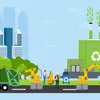Environmental friendliness to drive economic growth, value creation in India
Many organisations in India are still trying to figure out how to evaluate the criticalness to protect the environment for future generations. The time has come to seriously contemplate the fact that our economy’s resilience and strength lie in how organisations deal with day-to-day operations.
Evidence suggests that climate change is having an adverse impact on how quickly countries are developing globally, with obvious ramifications for the economy, employment, and the environment.
According to the International Labour Organisation (ILO), the increasing frequency of various environment-related hazards has already reduced labour productivity, with over 23 million working life years lost annually between 2000-2015. The greatest impact is being seen in developing countries like India, China, and Brazil, which rely primarily on agriculture and manufacturing industries for a large percentage of their growth and employment.
Therefore, it becomes especially important to include policies for climate change in the economy and encourage sustainable manufacturing.
India as a country holds great potential when it comes to transforming the economy owing to its young population that can harness greater opportunities in every sphere. The COVID-19 pandemic has also turned consumers to be more cognizant of the environment, forcing companies and brands to become more sustainable and embrace change.
While many organisations have adopted an all-inclusive Environmental, Social, and Governance (ESG) model to ensure a better tomorrow, still a few companies are trying to figure out exactly the approach to their goals and how to evaluate the criticalness to protect the environment for future generations. The time has come to seriously contemplate the fact that our economy’s resilience and strength lie in how organisations deal with day-to-day operations.
Research by management consulting firm McKinsey and Company shows that over 60% of companies having a clear ESG framework have improved profitability and created value for all stakeholders. This is created through a multitude of factors, including top-line growth as consumers are increasingly moving to sustainable products, reduction in legal complexities, a boost in employee productivity and morale, and lower energy consumption.
In addition to that, one of the leading Mumbai-based sustainable manufacturing companies could make up their energy portfolio for up to 50% renewable through rooftop solar and plan to ramp it up to 100% by 2024.
Electric mobility is another promising global strategy for decarbonising the transportation sector considering that India is the fifth largest car market in the world and is continuing to grow.
Therefore, there is a dire need for environment-friendly mobility solutions. Moreover, India is one of only a few countries that support the global EV30@30 campaign, which aims to have at least 30% of new vehicle sales be EVs by 2030. However, this will not be easy.
To ensure the manufacturing of EVs is undertaken in India at scale, it is critical to develop the entire ecosystem, starting from the magnet that powers the motor right up to the final assembly of the car.
Currently, China has an 80% market share globally in the production of Rare Earth magnets that are used in Electric Vehicles. However, India has the 6th largest deposit of Rare Earths globally and it is important for the government to introduce policies that incentivise companies to take advantage of this and allow Indian companies to be competitive in magnet manufacturing. This could include benchmarking of prices to what companies in China are paying, capital and land subsidies, and lower cost of power.
In conclusion
The world needs better strategies and technologies to deal with climate change and its impact. The whole of humankind should work towards initiatives that save mother earth for future generations. Even the smallest step will add on to become a better tomorrow for each of us.
As Pope John Paul II once said, “The Earth will not continue to offer its harvest, except with faithful stewardship. We cannot say we love the land and then take steps to destroy it for use by future generations.”
Edited by Megha Reddy
(Disclaimer: The views and opinions expressed in this article are those of the author and do not necessarily reflect the views of YourStory.)








